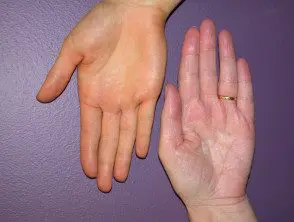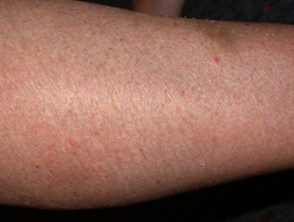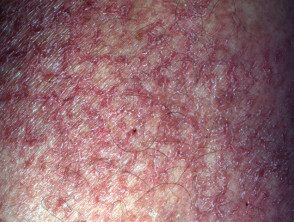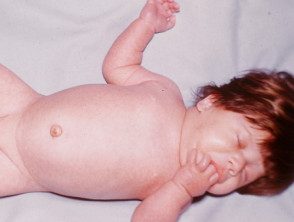Introduction
Abnormal levels of circulating thyroid hormone (thyroxine) and underlying diseases can cause alterations in the appearance of the skin, hair and nail. The thyroid gland may be overactive, resulting in hyperthyroidismor underactive, resulting in hypothyroidism, discussed here.
What is hypothyroidism?
Unlike hyperthyroidism, in hypothyroidism, the thyroid gland is underactive and causes a reduction in thyroxine production.
Who gets hypothyroidism?
Hypothyroidism can occur at any age and sex but it is seen more frequently in women during the menopausal years (ages 40 to 50).
- Women are eight times more likely to be affected than men.
- Hypothyroidism is common in people with a personal or family history of autoimmune disorder such as type 1 diabetes, harmful anemia, vitiligo, lichen sclerosus and Addison's disease.
- Genetic Conditions associated with hypothyroidism include Down syndrome, Turner syndrome and cystic fibrosis.
What causes hypothyroidism?
There are several causes for hypothyroidism.
Autoimmune thyroiditis
Autoimmune thyroiditis is also known as atrophic thyroiditis or Hashimoto's disease when goiter is present.
- This is the most common cause of hypothyroidism in adults.
- Antibodies against the trigger of the thyroid gland inflammation and destroys thyroxine-producing cells.
Subacute thyroiditis
Subacute thyroiditis is also known as De Quervain's thyroiditis.
- Thyroiditis is inflammation of the thyroid gland.
- Subacute thyroiditis follows a virus infection or pregnancy
- The gland is painful and tender for several months.
- Thyroiditis is usually self-limited and resolves spontaneously without treatment.
- It initially causes a temporary overproduction of thyroid hormone (hyperthyroid phase), which is then followed by underproduction (hypothyroid phase) before thyroid function returns to normal.
Iodine deficiency
The element iodine is crucial for the synthesis of thyroxine.
- Iodine deficiency is the most common cause of hypothyroidism worldwide, especially in areas where iodine is less available, including certain regions of Southeast Asia and Africa.
Iatrogenic hypothyroidism
Hypothyroidism can arise from medications.
- Excessive intake of carbimazole or propylthiouracil is used to treat hyperthyroidism.
- Radioactive iodine (used to treat hyperthyroidism)
- Amiodarone, an iodinated medication used in heart disease, which can induce hyperthyroidism and hypothyroidism.
- Lithium, often used for mental illness and eating disorders. It can also induce hyperthyroidism and hypothyroidism.
- Alpha interferon
- Interleukin-2
- Contrast media containing iodine
- Thyroid surgery
Congenital hypothyroidism
Congenital hypothyroidism or cretinism, may result from the absence or incomplete development of the thyroid gland, defects in thyroid hormone metabolism or hypothalamicpituitary axis dysfunction. It's strange.
- Incidence is approximately 1 in every 4,000 live births
- Most commonly seen in multiple pregnancies (twins)
- There is a 2:1 female to male ratio
- It may be due to a genetic defect.
Rare causes of hypothyroidism
Rare causes of hypothyroidism include:
- Infiltration of the thyroid gland granulomas in sarcoidosisor amyloid in systemic amyloidosis.
- Pituitary gland disease that causes secondary hypothyroidism
- Hypothalamic gland disease, causing tertiary hypothyroidism
What are the clinical characteristics of hypothyroidism?
Hypothyroidism causes a reduction in the body's metabolic rate. It is characterized by:
- Cold periphery with thick pale and dry skin.
- Eczema craquelé – a form of dermatitis in which there is a crazy pavement that divides the surface of the skin
- A yellowish tone to the skin secondary to carotenamia
- Sparse, brittle hair that comes out in handfuls
-
Hair loss in the outer third of the eyebrows.
- Slow growing, striated and brittle nails
- Myxedema, resulting in swollen face, eyelids, hands and feet; a presentation of mucinosis.
- Delayed wound healing
Other common systemic symptoms due to hypothyroidism include weight gain, cold intolerance, low mood, and menstrual disorders (irregular or heavy periods).
Hypothyroidism

Carotemia

Dry Skin

Crackle eczema
The clinical features of congenital hypothyroidism include:
- Hypotonia and lethargy
- Feeding difficulties, resulting in poor weight gain and lack of growth
- Constipation
- Hoarse cry with reduced crying frequency
- Swollen appearance; large head with swollen limbs and genitals
- Big previous fontanel
- Cold, mottled skin, especially on the extremities.
- Flattened or flared nose associated with nasal obstruction
-
Macroglossia (enlarged tongue)
- Preserve
- Umbilical hernia
- Cardiac abnormalities: bradycardia, cardiomegaly or pericardial effusion
Congenital hypothyroidism

Congenital hypothyroidism
What are the complications of hypothyroidism?
Serious complications can occur if hypothyroidism is not treated:
- Cardiovascular heart disease, due to high levels of cholesterol and triglycerides
- Myxedema coma (hypothyroid coma), characterized by hypothermia, reduced level of consciousness and seizures. Myxedema coma is a life-threatening medical emergency that requires urgent hospital treatment. The mortality rate is up to 50%, especially in the elderly.
How is hypothyroidism diagnosed?
Hypothyroidism is diagnosed with thyroid function tests (TFT).
- Serum TSH is usually high.
- In pituitary or hypothalamic disease, TSH may be low or normal.
- Serum T4 and T3 levels are usually low.
- In subclinical hypothyroidism, TSH is slightly elevated in the presence of normal T4 and T3.
- In euthyroid sick syndrome*, TSH, T4 and T3 are all low.
* Euthyroid sick syndrome commonly occurs in patients suffering from serious non-thyroid diseases such as septicemiaburns and trauma. It is usually transient and no treatment may be required, as thyroid function usually returns to normal after recovery from the illness.
| – | TSH | Free T4 (thyroxine) | Free T3 (triiodothyronine) |
|---|---|---|---|
| (Primary) hyperthyroidism | Bass | High | High |
| Secondary hyperthyroidism | High | High | High |
| Subclinical hyperthyroidism | Bass | Normal | Normal |
| Primary hypothyroidism | High | Bass | Low or normal |
| Secondary hypothyroidism | Low or normal | Bass | Low or normal |
| Subclinical hypothyroidism | High limit | Normal | Normal |
| Euthyroid sick syndrome | Bass | Bass | Bass |
Serum autoantibodies are present in the 90-95% of autoimmune thyroiditis. They must include:
- Anti-thyroid peroxidase antibodies (TPO)
- Anti-thyroglobulin antibodies.
Complete blood count and inflammatory markers, such as C-reactive protein, are routinely included to detect anemia (commonly associated with hyperthyroidism) and systemic infection causing thyroiditis. Creatine kinase is tested to verify myopathyand lipids They are evaluated as hypercholesterolemia and hypertriglyceridemia common in hypothyroidism.
Images must include:
- Ultrasound of the thyroid gland, especially when hypothyroidism is associated with a goiter
What is the treatment for hypothyroidism?
Levothyroxine is the first line of treatment to replace the lack of thyroxine in the body.
- The dose varies from 25 to 150 mcg daily.
- A lower dose is prescribed initially and then gradually adjusted according to response and TSH level.
- Regular blood tests are required to ensure that patients receive the correct dose of treatment.
While side effects are rare, symptoms of hyperthyroidism can occur when too much thyroxine is taken; this includes diarrhea, irritability, sweating, and palpitations.
What is the result of hypothyroidism?
Most patients respond well to levothyroxine, and are usually on this medication for life.
